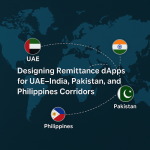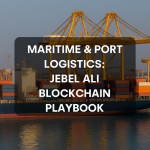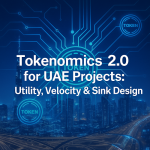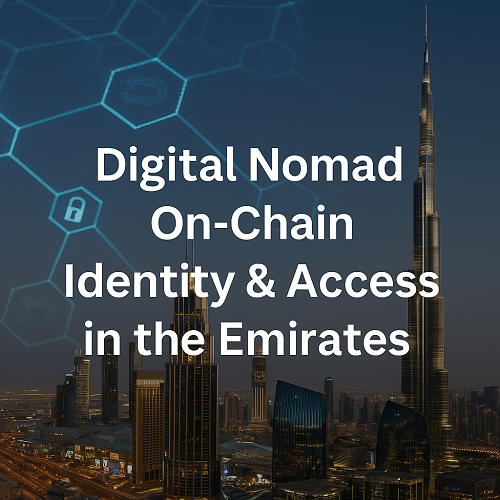Table of Contents
- Introduction: The Nomad Economy Meets Blockchain Identity
- Understanding On-Chain Identity in the UAE Context
- Why Digital Nomads Need Blockchain Identity
- Building Blocks of a Digital Nomad Identity Ecosystem
- Case Study: Dubai Remote Work Visa Program
- Practical Use Cases in the UAE
- Privacy Through Zero-Knowledge Proofs
- Legal and Regulatory Context
- Risks and Challenges
- Mistakes to Avoid
- Market Outlook 2025–2030
- Frequently Asked Questions (FAQs)
- Final Thoughts
- Work with Websima
Introduction: The Nomad Economy Meets Blockchain Identity
The UAE has become one of the world’s top hubs for digital nomads — remote professionals who work globally while enjoying Dubai’s infrastructure and lifestyle. With zero income tax, high-speed connectivity, and flexible visa options, it’s no wonder the region is leading the remote work revolution.
Yet one major friction point persists: fragmented identity verification.
Every time digital nomads open a bank account, rent a coworking desk, or renew a visa, they face multiple KYC and document-submission processes. This is where blockchain identity wallets — enabling digital nomad identity UAE solutions — offer a powerful fix.
By integrating verifiable blockchain credentials into UAE’s digital framework, these systems promise seamless, privacy-first access to residency, coworking, and financial services.
Understanding On-Chain Identity in the UAE Context
IN DUBAI, YOU PAY WITH YOUR SMILE
No card. No phone. Just a camera, your face, and a quiet cha-ching.
Biometric payments are live in Dubai – scan your smile, walk away billed.
Privacy concerns? Minimal. Simplicity? At max.
Welcome to the checkout of the future.
Source:… pic.twitter.com/E3qU0y2z42
— Mario Nawfal (@MarioNawfal) July 19, 2025
On-chain identity refers to verified digital credentials stored on a blockchain, controlled by the user instead of centralized authorities.
Each credential (for example, proof of income or residency) becomes a verifiable claim, cryptographically signed by a trusted issuer. These can be shared securely without exposing underlying data.
This system aligns perfectly with the UAE National Digital Government Strategy 2025, which aims to make government services accessible anytime, anywhere — securely and efficiently.
Why Digital Nomads Need Blockchain Identity
For digital nomads, identity management across jurisdictions is complex.
They juggle passport scans, bank verification forms, and repeated KYC for utilities or coworking memberships.
Digital nomad identity UAE systems eliminate this redundancy. By using blockchain-based wallets, professionals can carry verifiable credentials anywhere and instantly share only what’s needed.
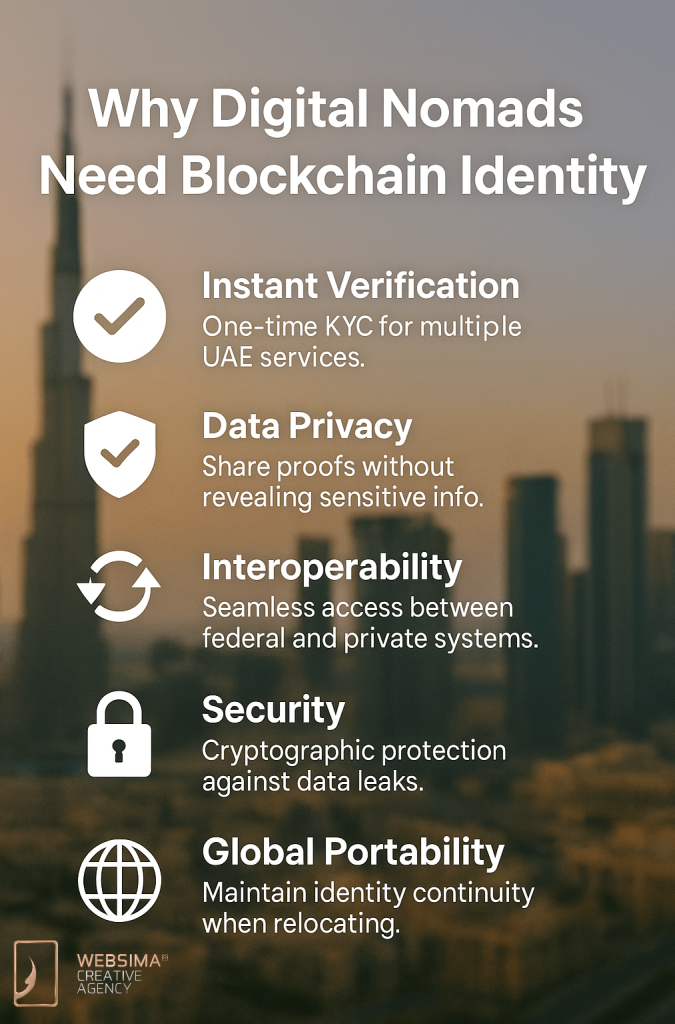
Benefits:
- Instant Verification: One-time KYC for multiple UAE services.
- Data Privacy: Share proofs without revealing sensitive info.
- Interoperability: Seamless access between federal and private systems.
- Security: Cryptographic protection against data leaks.
- Global Portability: Maintain identity continuity when relocating.
Building Blocks of a Digital Nomad Identity Ecosystem
A fully functional identity framework relies on four layers:
1. Verified Issuers
UAE entities such as VARA, DLD, and Emirates ID Authority issue verified digital credentials (residency, business license, tax records).
2. Self-Sovereign Wallets
Users store credentials in decentralized identity wallets based on W3C Decentralized Identifiers (DID) v1.0, ensuring global interoperability.
3. Verifiable Credentials (VCs)
Each document or license becomes a signed, cryptographically verified token, usable across ecosystems.
4. Service Integrations
Financial institutions, coworking providers, and real-estate portals use API-based verification — eliminating manual uploads.
Case Study: Dubai Remote Work Visa Program
The Residence Visa for Working Outside the UAE — known as the Dubai Remote Work Visa — allows foreign professionals to live in Dubai while working remotely for overseas employers.
Currently, it requires manual verification of salary, insurance, and employment proof. But if integrated with blockchain identity:
- Applicants could receive a digital visa credential stored in their wallet.
- Banks, telecoms, and coworking spaces could verify instantly.
- Renewals could be automated via smart contracts.
Such automation reduces document friction and speeds up service access — turning the UAE into the ultimate global workspace.
Practical Use Cases in the UAE
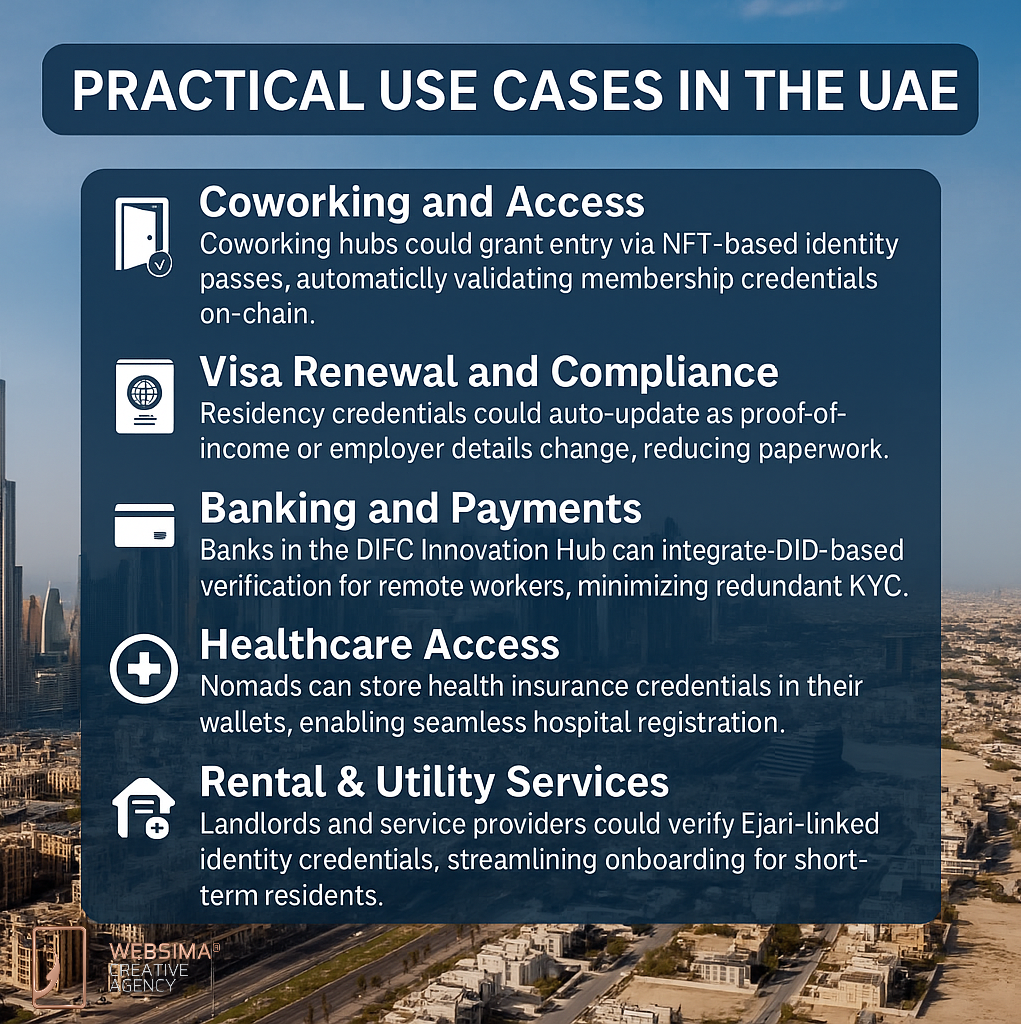
Coworking and Access
Coworking hubs could grant entry via NFT-based identity passes, automatically validating membership credentials on-chain.
Visa Renewal and Compliance
Residency credentials could auto-update as proof-of-income or employer details change, reducing paperwork.
Banking and Payments
Banks in the DIFC Innovation Hub can integrate DID-based verification for remote workers, minimizing redundant KYC.
Healthcare Access
Nomads can store health insurance credentials in their wallets, enabling seamless hospital registration.
Rental & Utility Services
Landlords and service providers could verify Ejari-linked identity credentials, streamlining onboarding for short-term residents.
Privacy Through Zero-Knowledge Proofs
Decentralized wallets must still align with national data policies. Exploring Web3 data residency in the UAE clarifies how storage location and privacy laws interact with ZK identity models
Blockchain identity frameworks rely on Zero-Knowledge Proofs (ZKPs) — cryptographic techniques that prove facts without revealing the underlying data.
For instance, a bank can confirm that a digital nomad’s salary exceeds AED 15,000 (visa eligibility threshold) without seeing the full pay slip.
The FATF Guidance on Digital ID officially endorses ZK-based systems for AML/KYC processes when regulated issuers validate credentials.
This makes ZKPs central to building compliant yet privacy-first digital-identity ecosystems in the UAE.
Legal and Regulatory Context
Dubai is among the few global jurisdictions to legislate virtual asset and blockchain activity directly.
Key frameworks include:
- VARA Rulebooks (2023): Define licensing for blockchain-based custodians and identity issuers.
- ADGM Digital Sandbox: Enables testing of decentralized KYC tools.
- Emirates Blockchain Strategy 2031: Targets 50% of government services on blockchain.
As these systems mature, UAE PASS and decentralized wallets may soon integrate, bridging federal and Web3 ecosystems.
Risks and Challenges
Regulatory overlap remains a concern, especially as FATF’s Travel Rule applies to VASPs handling identity-linked transactions. Learn more about Travel Rule compliance in the UAE to understand the operational side.
Despite its potential, several challenges must be addressed:
- Interoperability gaps between DID standards and national IDs.
- Key management risks for non-technical users.
- Legal ambiguities on cross-border data exchange.
- Cybersecurity threats targeting wallet credentials.
- Adoption barriers from legacy service providers.
Mistakes to Avoid
- Ignoring compliance with UAE’s data protection laws.
- Using closed identity ecosystems with no interoperability.
- Lacking user education around private-key recovery.
- Over-centralizing identity issuance.
- Failing to partner with regulated entities for verification.
Market Outlook 2025–2030
By 2030, digital nomad identity UAE frameworks will likely merge with global Web3 credentials and smart-contract-driven access systems.
Predicted trends include:
- Unified identity wallets combining UAE PASS + blockchain credentials.
- AI-verified employment data and automated residency renewals.
- Partnerships with other nomad hubs like Portugal and Singapore.
- Tokenized professional licenses and cross-border digital KYC systems.
The UAE’s proactive legal environment gives it a strong first-mover advantage in setting global standards for blockchain-enabled identity systems.
Frequently Asked Questions (FAQs)
Q: What does digital nomad identity in the UAE mean?
A: It refers to blockchain-based identification systems that let remote workers and freelancers verify themselves instantly across UAE platforms like coworking spaces, banks, and government portals.
Q: How does a blockchain wallet improve digital nomad identity in the UAE?
A: It allows users to store verified credentials on-chain, so they can prove residency, visa, or employment status without repeatedly uploading documents to different UAE services.
Q: Why is digital nomad identity in the UAE important for remote professionals?
A: It simplifies onboarding for banking, telecom, and coworking services, giving digital nomads faster access and stronger data privacy while meeting national compliance standards.
Q: Are digital nomad identity solutions in the UAE regulated or approved by authorities?
A: Yes. Entities like VARA, ADGM, and DIFC are testing blockchain-based KYC frameworks aligned with federal digital-identity and data-protection laws.
Q: Can digital nomad identity in the UAE connect with UAE PASS or federal e-services?
A: Integration is expected soon, enabling a seamless bridge between centralized UAE PASS credentials and decentralized Web3 identity wallets.
Q: How secure are digital nomad identity systems in the UAE?
A: These systems use encryption, private keys, and zero-knowledge proofs, ensuring higher protection than conventional centralized databases.
Final Thoughts
Digital nomad identity UAE frameworks are redefining what it means to live and work freely across borders. By merging blockchain security with government-backed trust, the UAE is setting a new standard for seamless, privacy-preserving digital access.
For nomads and businesses alike, this marks a shift from repetitive bureaucracy to verified simplicity — a secure identity layer for a borderless workforce.
Work with Websima
At Websima, we help businesses and governments integrate compliant blockchain identity solutions. Our expertise includes:
- Self-sovereign identity (SSI) wallet development
- Smart-contract credential issuance
- Zero-knowledge proof integrations
- VARA and DIFC regulatory alignment
If you’re building digital-identity or Web3 onboarding systems in Dubai, we can architect scalable, compliant, and user-friendly solutions.
Contact Websima to collaborate on decentralized identity or nomad-access systems in the UAE.


